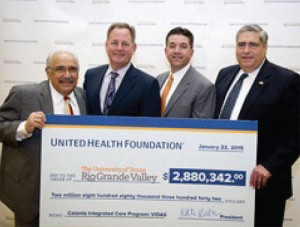 Where to Go for Health Care
Where to Go for Health Care
Freestanding ERs vs. Urgent Care Centers
When a problem doesn’t quite rise to the level of needing a hospital emergency room visit, Texas consumers often look to facilities like freestanding emergency rooms (ERs), urgent care centers, retail health clinics, walk-in doctor’s offices, and after- hours facilities as an alternative to traditional hospital emergency room care.
However, when a consumer is unaware of the differences between these types of facilities, he or she can be in for an unpleasant surprise when they get their bill. While urgent care facilities and freestanding ERs are alike in many respects, freestanding ERs typically bill at a much higher rate than urgent care facilities. A freestanding ER may charge up to four or five times more than an urgent care clinic for the same services.
The main reason for the disparity is that freestanding ERs typically charge “facility fees” in addition to the fees for the physicians’ time— just like traditional hospital ERs. Those fees have led to a backlash from some consumers who are stunned by their bills and have filed complaints.
Increased access certainly gives consumers more options for care, but it should be accompanied by increased transparency on prices and fees, so that consumers can make fully informed decisions.
A freestanding ER can be a good solution in critical emergency situations, but may not be necessary for the full range of medical services, especially routine care. With increased transparency, Texans can better manage their health care needs and their finances. Given the already high cost of health care, Texans deserve easy access to information that will allow them to make the best health care choices for themselves and their families.
Solutions
TAHP supports increased transparency for freestanding emergency rooms so consumers understand the scope of services available and potential costs. This should include mandatory prominent signage that discloses facility fee charges and network status.
TAHP supports allowing mediation for enrollees who are balance billed for freestanding ER services.
TAHP supports SB 425 relating to health care information provided by and notice of facility fees charged by certain freestanding emergency medical care facilities and the availability of mediation.
Senate Bill 425:
This week Senator Schwertner filed Senate Bill 425 which increases transparency requirements for freestanding ERs; this is one of TAHP’s priority bills for the 84th session. TAHPs press release on the bill can be found here: https://archivetxahp.com/press-releases/335-senate-bill-425-will-protect-texas-consumers-from-bill-shock
Health Plans Promote Healthier Births
Thirteen health plans have partnered with the Texas Department of State Health Services (DSHS) to support a coordinated and comprehensive approach to healthy pregnancies and improved birth outcomes in Texas.
The partnership, which was the result of ongoing meetings between DSHS and health plan medical directors, outlined strategies for reaching these goals in a Signed Agreement Letter released in January
- Develop messages for providers to use consistently with patients, regardless of payer, that are evidenced-based and relevant to specific populations
- Develop evidence-informed wellness programs for women of reproductive age to address preconception health
- Develop programs that reward facility, healthcare professional, and consumer behaviors that lead to healthy pregnancies and health care quality
- Work collectively to advance evidenced-based obstetric care such as the elimination of nonmedically indicated inductions and cesarean sections prior to 39 weeks, and reducing high cesarean section rates
- Develop specific perinatal metrics to ensure improvements in the health status of all Texas women
The partnership supports a collective approach between HMOs, public health, healthcare professionals, and Texas employers to improve healthy pregnancies and birth outcomes in Texas.
Health Plans Sign Healthier Birth
Agreement
- Aetna
- Blue Cross Blue Shield of Texas
- CIGNA/HealthSpring
- Community Choice Health Plan
- Cook Children’s Health Plan
- Driscoll Children’s Health Plan
- El Paso First Health Plan
- Parkland Community Health Plan
- Scott & White Health Plan
- Seton Health Plan
- Superior HealthPlan
- Texas Children’s Health Plan
- UnitedHealthcare
HHS Enrollment Snapshot – Week 11
The Department of Health and Human Services (HHS) has released its weekly snapshot of enrollment in the federally-facilitated Marketplace (FFM) for the week of January 24-30. Plan selections totaled 179,710 in this time frame, bringing total enrollment since November 15 to 7,473,699. At least another 2.4 million people have come in through state-run exchanges, bringing the total number of people who have signed up or re-enrolled for health insurance in state and federal marketplaces under the Affordable Care Act to about 10 million for 2015.
Other cumulative data since November 15 for the federal exchange include:
- Applications Submitted: 10,124,772
- Call Center Volume: 11,119,348
HEALTH PLAN MEMBER HIGHLIGHTS
United Health Foundation Announces $2.88 Million Grant the University of Texas Rio Grand Valley School of Medicine with Texas Governor Greg Abbott
On January 22nd, UHG CEO Steve Hemsley, Texas Governor Greg Abbott (R-TX), and leaders from the University of Texas Rio Grande Valley, including President Dr. Guy Bailey and Medical Dean Dr. Francisco Fernandez, announced a $2.88 million United Health Foundation grant to help support the Colonia Integrated Care Program: VIDAS (Valley Interprofessional Development and Services). Specifically, the initiative aims to unite the region by building an integrated collaborative that will create a sustainable model for health care delivery to the most vulnerable members of the community. The grant will support increased health care access in Rio Grande Valley communities, augment the workforce that provides care for the communities, establish the infrastructure to form a collaborative care/ learning center, and provide an environment for integrated inter-professional health care education.
In his remarks, Governor Abbott welcomed the continued investment UHG is making in the state, highlighted UHG’s Enterprise-wide footprint in Texas, and thanked UHG “for their efforts to make Texas better.”

From left to right: Dr. Francisco Fernández, Founding Dean, University of Texas Rio Grande Valley School of Medicine; Don Langer, CEO, UnitedHealthcare Community Plan Texas; Dave Milich, CEO, UnitedHealthcare South Texas; Tom Quirk, CEO, UnitedHealthcare Texas
ASSOCIATE MEMBER HIGHLIGHTS
TAHP would like to welcome one of our newest associate members, DentaQuest: Improving Access and Quality while Managing Program Costs in Texas
DentaQuest is privileged to serve as one of the dental managed care organizations for the statewide Medicaid and CHIP dental programs. DentaQuest has partnered with the Texas Health and Human Service Commission to administer the program since 2012. Approximately 56% of the Texas Medicaid Dental Program recipients are DentaQuest members.
Improving Access
Member access to care is directly related to network adequacy. DentaQuest maintains a robust network of providers to serve the children of Texas through its contracts with 5,290 providers at 4,040 locations across the state. Combined, these numbers represent 23,140 service access points. This represents a 12% increase in network size since the inception of the program.
Community outreach and oral health education are vital in influencing preventive care. DentaQuest member advocates are located regionally throughout the state, partnering with school districts and community organizations to promote the importance of oral health. In fiscal year 2014, they attended 904 health fairs and 350 educational events/presentations at schools. Each of DentaQuest’s member advocates are certified Community Healthcare Workers (Promotora).
Culturally and Linguistically Appropriate Services (CLAS) are important to improve access to care, quality of care, and ultimately health outcomes. Thanks in part to a robust outreach program that takes into account the cultural language diversity of Texas, and an expansive provider network, 75.44% of Medicaid members 1-20 years old and 68.59% of CHIP members 1-18 years old had at least one preventive dental service in 2013.
DentaQuest tackles oral health disparities from several angles, not just as a dental benefits administrator. DentaQuest operates an independent foundation, the DentaQuest Foundation, which has invested over $615,000 over the past two years to Texas community organizations and programs, such as Miles of Smiles, Project Saving Smiles, and El Centro de Corazon to increase the number of Texans receiving dental care and oral health education.
Improving Quality
Prevention-based care is the core of our approach. DentaQuest’s industry leading Preventistry program is increasing the number of high-risk children receiving preventive fluoride treatments and sealants, and the timeliness of oral evaluations. DentaQuest plans to expand its efforts to impact more children.
DentaQuest’s provider incentive program promotes quality outcomes and increased efficiency. DentaQuest measures the performance of each dentist against their peers and offers financial incentives to providers for performing sealants and fluoride. In 2014, DentaQuest paid out over $4 million to providers through this initiative.
Reducing Program Costs
Increasing access and improving the quality of dental care while containing program costs at one time seemed a contradiction in terms. But DentaQuest has demonstrated that this is achievable goal for the state of Texas. From FY 2011 (prior to managed care) to FY 2012 (first year post managed care), the dental claims cost and administrative rate dropped by nearly 35%.
 February Birthdays
February Birthdays
02/02 King, Susan
02/03 Rose, Toni
02/04 Davis, Yvonne
02/05 Stephenson, Phil
02/09 Button, Angie Chen
02/11 Schaefer, Matt
02/13 Zaffirini, Judith
02/15 Naishtat, Elliott
02/17 Dutton, Jr., Harold V.
02/18 Paddie, Chris
02/21 Flynn, Dan
02/22 Darby, Drew
02/26 White, Molly S.
02/26 Turner, Scott
02/29 King, Phil


